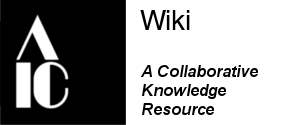Contribute to the Objects Wiki
Back to the Objects Page
 Objects Specialty Group Conservation Wiki
Objects Specialty Group Conservation Wiki
Growth of the Objects catalog depends on the volunteer efforts of trained objects conservators like you. It is not difficult to contribute, but it does take time to acquaint yourself with the Wiki software and the standards of the community.
Getting Started[edit | edit source]
Your first step is to request "creator" status through the AIC e-Editor Rachael Perkins Arenstein. This will let you edit pages, upload pictures and files, make a user page, and all the other functionalities. The AIC e-Editor will check to make sure you are a conservator or preservation professional and will have you sit in on a brief online Wiki Training which will help orient you with AIC's Wiki plans, Specialty Group efforts, Wiki etiquette, and general editing guidelines and protocols.
Formatting for Wikis can be a little tricky. We've created some helpful guides for formatting and templates that can get you started with tips on how to begin new pages, create links, and add photographs. Please review these guides to become familiar with their content before you begin working on the Wiki. The current OSG committee chair for the AIC Wiki, Rebecca Gridley, can also assist you with technical help.
Once you're comfortable editing and creating content on your own, we ask that you follow the rules that developed on Wikipedia and the AIC User Guidelines. Generally, they are to "Be Bold" in making well-founded changes while maintaining civility.
Community Guidelines[edit | edit source]
The following guidelines are heavily based on Wikipedia's List of Guidelines.
Behavior[edit | edit source]
Behavioral Guidelines outline ways for editors to act and interact. They offer a standard which the community can look towards when there are conflicts of interest, edit wars, "newbies" who aren't aware of the community standards, and disputes.
- Assume Good Faith: Unless there is strong evidence to the contrary, assume that people who work on the project are trying to help it, not hurt it.
- Conflict of interest: You are welcome to discuss yourself, your website, and your organization on your user page. However, you are not welcome to promote yourself, your website, or your organization on article pages -- these pages are reference material, not marketing copy.
- Disruptive editing: Participants with a pattern of edits that has the effect of disrupting progress toward improving an article or the fundamental project of building an encyclopedia may be blocked or banned indefinitely.
- Do not disrupt the Catalog to illustrate a point: State your point. However, do not spam, disingenuously nominate articles for deletion, push rules to their limits, or otherwise create work for other people just to prove your point.
- Etiquette: Contributors have different views, perspectives, and backgrounds which sometimes vary widely. Treating others with respect is key to collaborating effectively in building an encyclopedia.
- Please do not bite the newcomers: Many new contributors lack knowledge about our policies. Nevertheless, always understand that new contributors are future experts and are therefore our most valuable resource.
- Signatures: Sign all of your posts on Discussion pages by typing --~~~~ to be accountable and to help others understand the conversation. Do not include your signature in articles.
- Talk page guidelines: Talk pages are for polite discussion serving to improve the encyclopedia, and should not be used to express personal opinions on a subject.
Content[edit | edit source]
Content guides offer advice on identifying and discussing information here on the Catalog, as well as provide pointers for naming pages, organizing categories, general editing, and inserting images.
- Be Bold in Creating and Editing articles
- Organize Without Over-organizing
- Keep the Content Professional and the Tone Civil
- Format from Templates
- Keep Styles Simple
- Use Naming Conventions
Back to the Objects Page.
